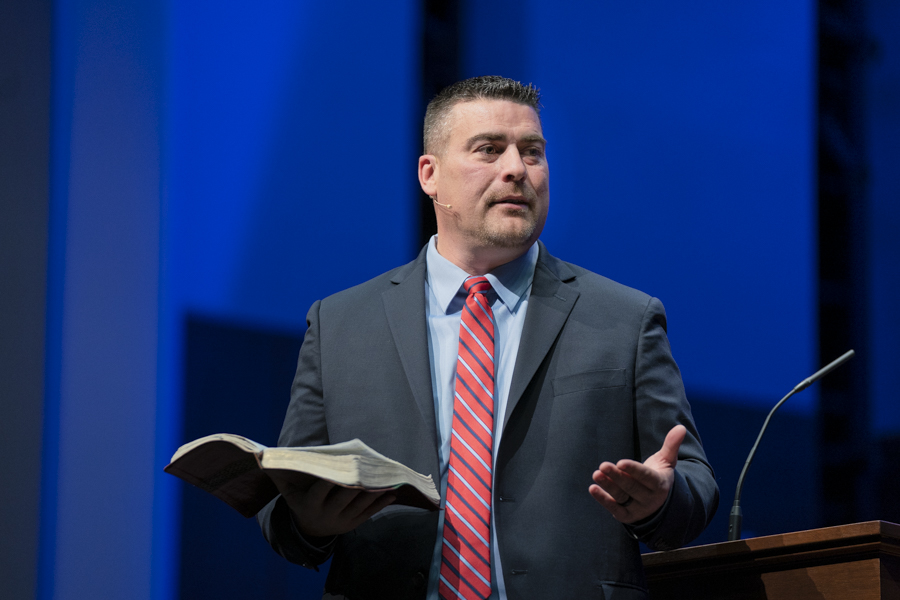Pursuit of God’s glory should be goal of ministry, Lorick says in chapel message


“Begin your ministry with how you want to end your ministry in sight, and I believe it will change your ministry,” Nathan Lorick, executive director of the Southern Baptists of Texas Convention (SBTC), advised in his March 8 chapel message at Southwestern Baptist Theological Seminary and Texas Baptist College.
In his introduction of Lorick, Adam W. Greenway, president of Southwestern Seminary and Texas Baptist College, noted his appreciation that SBTC and the seminary share the “same heartbeat” with a “commitment to a high view of Scripture, to confessional fidelity, to the Great Commission, and to cooperation.”
Directing the attention of the assembly to Acts 20:13-24, in which Paul speaks to the Ephesian elders before his return to Jerusalem, Lorick explained that in this Scripture passage, Paul presents four marks of a great leader.
The first mark of a great leader, Lorick observed, is authenticity that is not afraid to admit and embrace brokenness. He emphasized that despite an impressive list of accomplishments during his years of spreading the Gospel, Paul admitted that he did not “always get it right.” He added that Paul endured trials, difficulties, and tears with a spirit of humility.
“I don’t trust a leader who has never been broken,” Lorick said. He added that God can shape the broken into great leaders and explained that God calls, breaks, and blesses leaders who have “come into grips with their humanity and weakness.”
“Lead forward in authenticity but do so with humility and brokenness always within the forefront of your mind and heart,” Lorick encouraged.
The second mark of a great leader is a conviction that does not change based on the circumstances, Lorick said, referring to verse 20. Noting that Paul did not waver in the face of trials, adversity, or affliction, but rather stood firm on his conviction, Lorick emphasized, “The mark of a great leader is one who stands firm on the biblical convictions in which God has poured forth in his Word.”
“As you go forward in ministry, there will be many whose convictions will change with the wind,” Lorick cautioned. “You will see this. Some whose convictions will bend under the stress of cultural, or societal, or relational pressures. There will be some who will change their convictions for personal gain.”
However, he reminded the assembly, “Yet, there will still be some who will not waver when pressure arises, who will stand firm on what they believe. There will be some who will draw a line in the sand and drive a stake deep into the foundation of the truth of God’s Word. Let that be you as you go and lead in the way God calls you to lead.”
The third mark of a great leader is one who is resolved to advance the mission in times of uncertainty, Lorick noted, referring to verses 22-23.
“Ministry is hard,” Lorick warned. He added that while seasons of difficulty and challenge in leadership are inevitable, and that trials, adversity, and uncertainty are to be expected, “God’s Spirit empowers you daily to walk through those things, and when you are looking at an uncertain future, you can hold to the promise that God is in your tomorrow already waiting on you to get there.”
Lorick observed that Paul knew hardship, imprisonment, and afflictions awaited him, yet he was resolved to go to Jerusalem because he was “constrained by the Spirit to go, resolved in his heart and in his spirit that he is to advance the mission that God has put him on regardless of the consequences that would await him, regardless of the circumstances of difficulty and trial.”
“There will be times in your ministry that the only thing you have to go to is that calling that you got from God,” Lorick advised.
Lorick challenged the assembly to ask themselves what level of known affliction would keep them from pursuing their mission field and how resolved they would be to pursue their calling in the face of affliction, observing that Paul resolved to go to Jerusalem knowing the adversity that awaited him there.
Lorick said the fourth mark of a great leader is the ability to focus on what really matters and to keep that in perspective, referencing verse 24. He explained that Paul possessed the perspective that “his life is of no value except fulfilling what God has called him to do.”
“Avoid a virtual reality ministry,” cautioned Lorick. He explained that ministry leaders can hold a “virtual reality” in which they pursue titles, accolades, and positions, but that the reality through the lens of God’s eyes according to Paul is that “our life is really worthless apart from the grace of God and the calling of God.”
The right perspective according to Paul, Lorick noted, is that despite the powerful ways Paul was used throughout his ministry, his life was nothing apart from the grace of God, the empowerment of the Holy Spirit, and the calling to walk humbly before Him.
Closing his sermon, Lorick urged the assembly to never lose focus, but rather to pursue “His glory.”
Lorick has served as executive director of the Southern Baptists of Texas Convention since 2021. A past pastor and evangelism director of the SBTC, he also previously served as the executive director of the Colorado Baptist General Convention.
The entire sermon can be viewed here.
Chapel is held every Tuesday and Thursday morning at 10 a.m. (CT) in MacGorman Chapel on the campus of Southwestern Baptist Theological Seminary. Chapel may be viewed live at swbts.edu/live.



